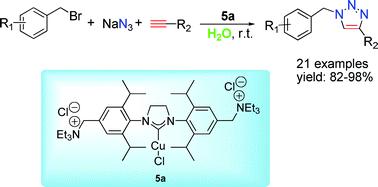Researchers Develop a New Class of Water Soluble Cu(I)–NHC Complexes with High Activity
Researchers at the State Key Laboratory for Oxo Synthesis and Selective Oxidation of the Lanzhou Institute of Chemical Physics, Chinese Academy of Sciences, have developed a series of reusable ammonium salt-tagged [(SIPr)CuX] complexes, which showed highly efficient reactivity toward the three component click-reaction of a wide arrange of benzyl bromides and alkynes using water as solvent at rt. The optimized catalyst 5a could be conveniently recycled up to three times without a significant loss of its activity with catalyst loading as low as 2.0 mol% in the fresh run.
The observed higher catalytic activities of this ammonium salt-tagged [(SIPr)CuCl] compared to its standard neutral analogue demonstrates the potential of ionic functionalization of NHC– Cu(I) complex in promoting CuAAC catalysis and achieving catalyst recycle. Current experiments in their laboratory are directed at the synthesis of new recyclable transition metal-NHC complexes and their catalytic applications.
NHC-transition metal complexes have attracted considerable attention owing to their high stability and outstanding application in homogeneous catalysis. However, most of them are complicated to synthesize through multiple steps and only can be used for one time in the homogeneous reaction.
 |
Next Article:Non-phosgene Synthesis of Isocyanate Precursors